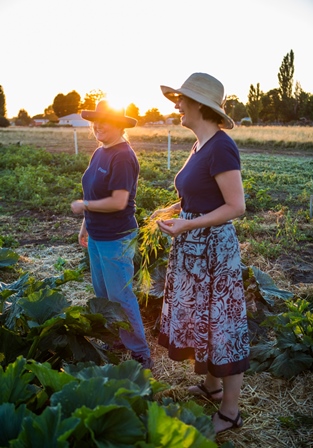 Within the first week of service, the coordinator started attending monthly Food Access Coalition meetings. The Coalition’s members had a strong understanding of the county’s agricultural landscape and shared that knowledge. Because they had personal relationships with farmers, coalition members were able to introduce the coordinator to many local farmers. This rapport went a long way in building relationships between farmers and FISH Food Bank.
Within the first week of service, the coordinator started attending monthly Food Access Coalition meetings. The Coalition’s members had a strong understanding of the county’s agricultural landscape and shared that knowledge. Because they had personal relationships with farmers, coalition members were able to introduce the coordinator to many local farmers. This rapport went a long way in building relationships between farmers and FISH Food Bank.
Participating in the Coalition meetings and planning sessions also shed light on the realities of Kittitas County agriculture, namely, that 50 percent of agricultural land is pasture, 14 percent is woodland or other, and 36 percent is cropland. Of the cropland, more than 90 percent of it is used for grain production such as hay, wheat, alfalfa, barley, chickpea, etc.
After a farmer or fruit tree owner agreed to donate his or her produce, the coordinator called to schedule a time to harvest and called to give a reminder on the same day. When a household donated their produce, the coordinator always offered to fill a small box to set aside for them as a token of gratitude.
Farmers are usually interested to know how much produce they donate, so FISH weighs everything that comes in and promptly gives a receipt and thank-you card to the donor. On a prominent wall inside the food bank is space dedicated for recognition of many of the most generous contributors.

 Within the first week of service, the coordinator started attending monthly Food Access Coalition meetings. The Coalition’s members had a strong understanding of the county’s agricultural landscape and shared that knowledge. Because they had personal relationships with farmers, coalition members were able to introduce the coordinator to many local farmers. This rapport went a long way in building relationships between farmers and FISH Food Bank.
Within the first week of service, the coordinator started attending monthly Food Access Coalition meetings. The Coalition’s members had a strong understanding of the county’s agricultural landscape and shared that knowledge. Because they had personal relationships with farmers, coalition members were able to introduce the coordinator to many local farmers. This rapport went a long way in building relationships between farmers and FISH Food Bank.